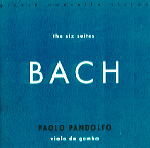Gamba virtuoso Paolo Pandolfo previously showed his powerful affinity for Bach on a 1994 Harmonia Mundi recording of the Sonatas for viola da gamba and harpsichord, reissued a couple of years ago in the label’s “Bach Edition” series (for a review, type Q746 in Search Reviews). Here, he offers his ambitious adaptations for gamba of the six Suites for Solo Cello–a project that if nothing else reveals both the felicities and awkward, ungraceful incompatibilities of this kinship of instruments and stylistic traditions. The first thing you may notice is that the keys–four of the six–are not the originals. For example the G major Suite No. 1, probably the most familiar of the set, is played in C major, the C minor Suite No. 5 is played in D minor, and so on. Although this may be a bit disorienting to listeners whose ears “know” the original keys, the reason Pandolfo has transposed them is not only to allow him to play the notes, but also to take full advantage of the gamba’s natural sonorities–in his words, “to let the instrument suggest the solutions suitable for each moment.” Indeed, we do hear the room-filling resonance and sympathetic vibrations produced by the lowest open strings, especially in the opening to the Fourth (G major) and Fifth (D minor) suites, and the overall benefit to the sonority certainly justifies these modifications. But these aren’t the only changes. Pandolfo explains that he has had to alter octaves in some places and occasionally, “voices” heard prominently in the cello versions “disappear”, and new voices “appear embellished, even though they did not exist or were merely implied.” Okay, but what all of this means to the listener is that hearing these versions of Bach’s revered solo cello suites will necessitate setting your preconceived notions aside and opening your mind and ears to a new experience of the music.
In a word, Pandolfo’s interpretations are among the more idiosyncratic on disc; unlike with the abovementioned sonatas, he seems to take the view that because he’s all on his own here, he has license to stretch, shrink, bend, and twist Bach’s lines like so much taffy, giving it shape and form here, and then undoing it over there. The slow movements of course bear the brunt of this–and it’s not necessarily a bad thing, especially if you like Pandolfo’s brand of bold, robust, firmly articulated playing–or his flavorful touches such as the lute-like pizzicato in mid-Sarabande of Suite IV, which he brings back at the movement’s conclusion.
Pandolfo’s instrument has a beautiful, reedy, warmly penetrating tone–reproduced here in an agreeable, slightly dry acoustic–and his technique certainly enables him to roam freely over, around, and through any of the score’s potential pitfalls. For whatever reason, Pandolfo is at his best–and it’s really outstanding–in the Suite No. 4, where he just plays the music without fussing and mussing too much with it. The less-elegant moments–the Gigue of the First suite, the Bourrées of the Third, for example–tend to come in movements that involve lots of leaps and multiple-stops, places that on the cello ring with more natural flow and clarity of line than Pandolfo is able to conjure from his gamba. I suppose that the closest comparison with this recording would be Pieter Wispelwey’s readings with Baroque cello on Channel Classics. However, his assured, confident, and comparatively meticulous yet prodigiously musical readings have more to say about Bach than these Pandolfo realizations. I still prefer Mischa Maisky’s luminous, deeply-felt performances in his first DG traversal, or Mari Fujiwara’s sonorous, sensuous, ultra-poetic versions for Denon (both out-of-print but worth finding).
































